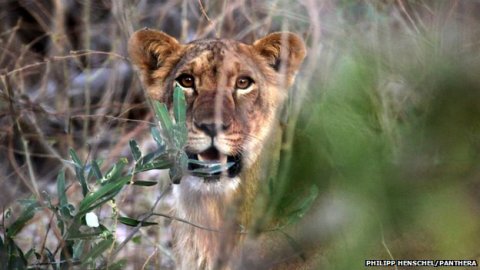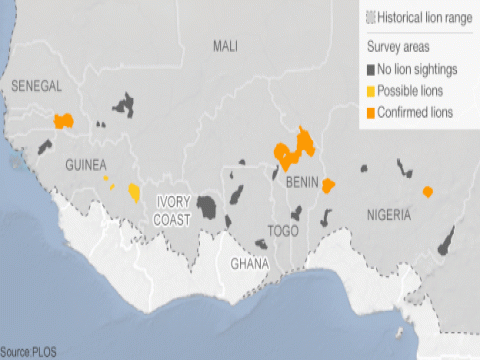Lions facing extinction in West Africa
Lions facing extinction in West Africa. There has been a catastrophic collapse in the number of lions in West Africa, with only around 400 left in the region, a new survey suggests. With fewer than 250 mature lions of breeding age, there are concerns the entire population could disappear. The research by Panthera, a non-profit organisation, was carried out in 17 countries, from Senegal to Nigeria, and took more than six years. West African lions are genetically distinct from others in Africa. In 2005, West African lions were believed to live in 21 different protected areas. But the survey, published in the scientific journal PLOS One, suggests lions now exist in just four of those sites. The report says lions now roam in just 1.1% of their historic range in West Africa. The majority of their habitat has been converted for agricultural use, says Philipp Henschel, co-author of the report. Panthera is calling for the lion to be listed as critically endangered in West Africa: all but a few of the areas we surveyed were basically paper parks, having neither management budgets nor patrol staff, and had lost all their lions and other iconic large mammals. The conservation of lions in West Africa have been largely neglected, whereas in eastern and southern Africa where millions of dollars a year are spent. The researchers discovered that West African lions now survive in only five countries; Senegal, Nigeria and a single trans-frontier population on the shared borders of Benin, Niger and Burkina-Faso. These lions have unique genetic sequence not found in other lions including in zoos or captivity. If they are lost then a unique locally adapted population will become extinct, researchers say. Large-scale plantations for cotton and food crops have contributed significantly to the decline of the lions in the last decade, the survey found. Today, lions are largely restricted to protected areas, and the poaching of animals - usually preyed upon by lions - to supply local bushmeat markets is probably the main threat, said Mr Henschel. "In some areas, we also witnessed the retaliatory killing of lions by herdsmen that entered protected areas illegally with their herds of cattle and goats," he said. Funding crisis A lack of funding for conservation coupled with an increasing human population and impoverished economies, means lions are increasingly vulnerable, researchers say. "We are talking about some of the poorest counties in the world - many governments have bigger problems than protecting lions," Mr Henschel said. West African Lions have special significance in the culture of the region. They are a symbol of pride for the governments and people, and are represented on the coats of arms of several countries. The International Union for Conservation of Nature (IUCN) says concerted international help is urgently needed. Benin and Senegal are working with the research team to establish a National Lion Action Plan to identify ways and measures to save the lions in their countries. "Lions have undergone a catastrophic collapse in West Africa. The countries that have managed to retain them are struggling with pervasive poverty and very little funding for conservation," says Panthera's President Luke Hunter. To save the lion will require a massive commitment of resources from the international community."






Recent comments